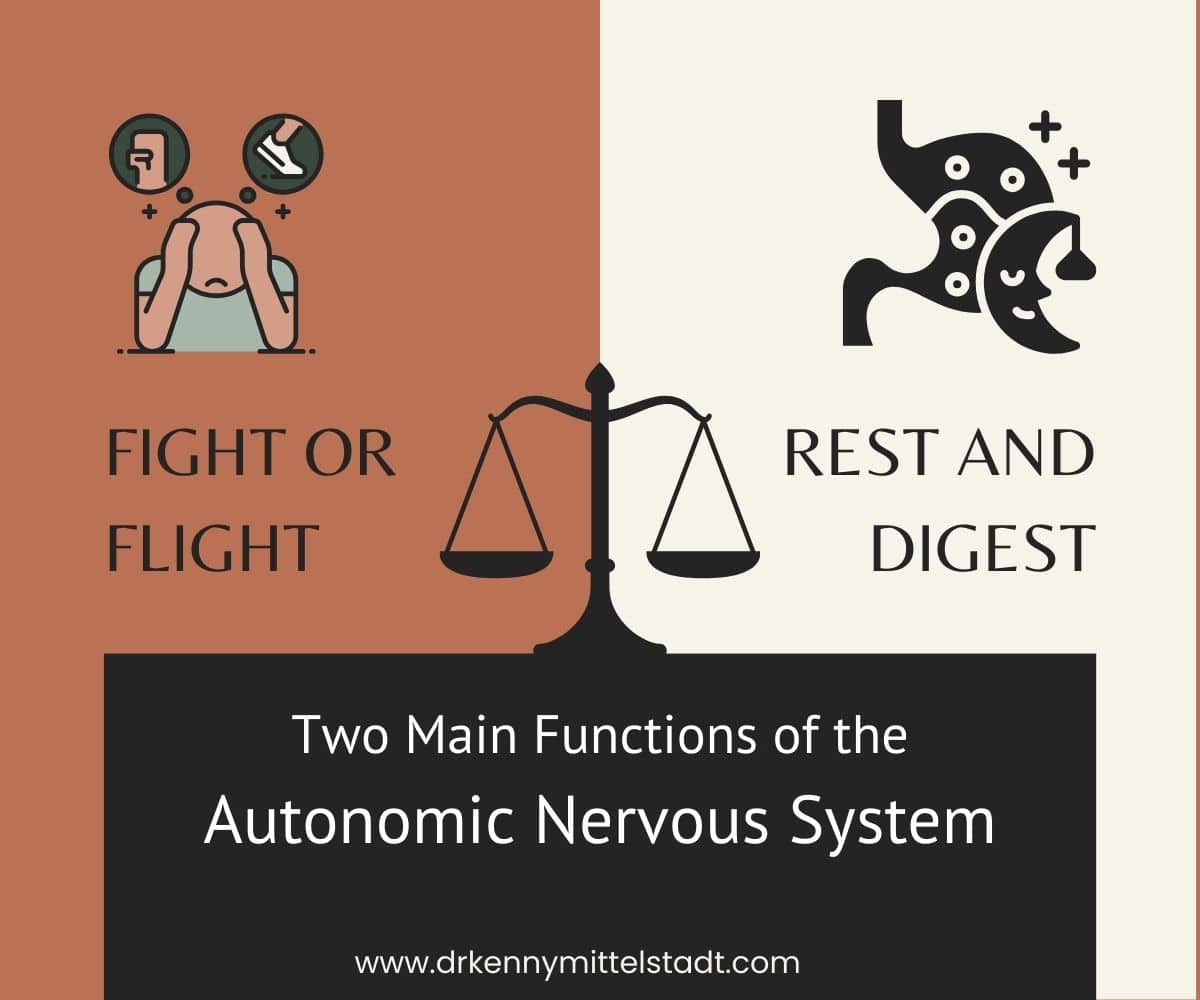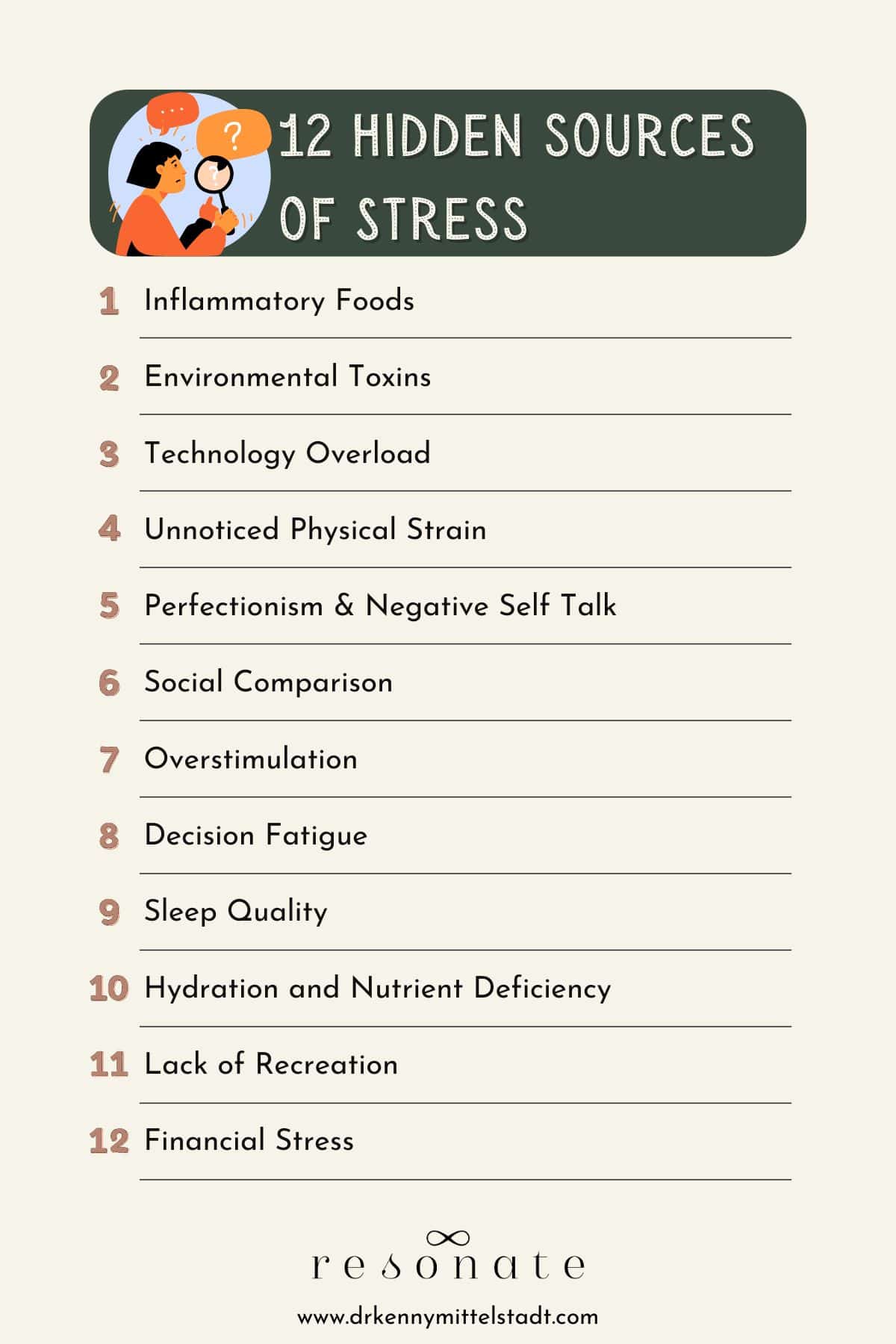“But I don’t feel stressed.” I frequently hear this phrase from my patients when we start discussing the potential impact that “stress” might be having on their health and healing journey. Functional medicine places much weight on the impact that stress has on our overall well being.
Our society still seems to have a knee-jerk reaction that views stress as weakness or taboo. To be blunt, I would argue that we are one of the most stressed out societies in human history. The burden of stress is real and isolating. In fact, 61% of Americans felt that people around them expect them to just “get over their stress. (Stress in America 2023 by the APA)
We could be talking about hormone imbalances, sleep issues, difficulty losing weight, low energy energy levels, or many other complaints. I love seeing the “aha moments” unfold when we dive into the topic of stress and its hidden sources.
Stress doesn’t always have to manifest in our conscious awareness. It’s more than just “feeling” stressed. As we explore this topic, see if any of these hidden sources of stress make regular appearances in your life.
Let’s dive in!
What is stress?
Stress is a universally human experience. Basically, stress is any physical or mental signal (a stressor) that prompts our systems to respond in some way! Also, stressors come in many forms from physical and emotional demands to environmental and relationship situations.
When functioning normally, our body and mind are designed to respond to stress, overcome any given stressor, and then return to a normal, balanced state. This balanced state represents a balance between the “fight or flight” (sympathetic) and “rest and digest” (parasympathetic) functions of our autonomic (outside our conscious control) nervous system.

You may have heard of the fight or flight response, and this is the classic example of the systems that are activated to respond to a stressor. We’ve all felt it – an increased heart rate, alertness, the urge to run or fight. When functioning suboptimally or when the stressor is too severe or too chronic to overcome, this can create imbalances in a variety of ways.
Our body responds to stress by activating our nervous system and sending hormonal signals in complex, coordinated ways. Our HPA-Axis is one such governing body that coordinates the way our brain, nerve, and adrenals react to stress.
When this “fight or flight” response is activated long-term (chronic), imbalances can occur. Chronic stress can be quite sneaky and insidious. Sometimes it’s harder to recognize the signs of chronic stress, but it permeates virtually every condition we experience today.
How is health affected by stress?
What does chronic stress feel like? How do we know if chronic stress is affecting our health. Chronic stress has the potential to affect our physical health, mental health, and even shape our behaviors. Here are some examples of ways that our health may be affected by stress.
Physical Manifestations of Stress
- Hormonal imbalances
- Feeling “Tired but Wired”
- Sleep issues
- Fatigue and Low Energy
- Pain
- Worsens inflammation
- Gut health issues
- Poor immune system function
Mental/Emotional Manifestations of Stress
- Depression
- Generalized anxiety disorder
- Lower cognitive function
- Difficulty concentrating
Behavioral Manifestations of Stress
- Alcohol abuse
- Cigarette smoking
- Other addiction
- Overeating and undereating
This is not an exhaustive list, but provides a starting point to see the many way that stress can affect all aspects of health.
12 Hidden Sources of Stress:
Now let’s get into 12 hidden sources of stress that deserve some attention. Open dialogue might just be part of how we overcome these secret stressors as a society.
I will simply introduce each of the stressors, and in future blog posts, we can dive into how to overcome such stressors in more detail.

1. Inflammatory Foods:
What we eat is a monumental source of hidden stress to our bodies. We don’t often think of food as stress, but it has a dramatic potential to be just that. And not just to our guts, but to our entire body. The gut is connected to everything – gut-brain, gut-heart, gut-skin, gut-immune, and beyond!
Added sugars, trans fats, processed foods even those tasty burnt bits on your barbecued meat or roasted vegetables, and be direct sources of stress.
2. Environmental Toxins:
Every year, 700 new toxic chemicals are registered in the U.S. The World Health Organization considers toxin exposure in many forms as a key risk factor for many top diseases of our world. These include heart disease, stroke, cancers, mental health disorders, asthma, and many more!
Many of the chemicals we’re exposed to haven’t even been evaluated for their long term or even short term safety, and this provides a very difficult conundrum. These are silent sources of stress on our bodies, and might have a compounding effect when it comes to our body’s ability to eliminate them.
3. Technology Overload:
Though you may find doom scrolling quite relaxing, it’s actually keeping your nervous system in a state of sustained action. Aside from the direct actions on our bodies and nervous systems, technology overload has been associated with isolation and other concerns with our mental well-being.
4. Unnoticed Physical Strain:
As a chiropractor, I see how our poor posture and lack of physical endurance affects my patients daily. Indeed, the phrase “sitting is the new smoking” is something that is playing out before our eyes. Lack of activity, or poor stabilization against gravity (poor posture) causes secret, insidious physical stress.
5. Perfectionism and Negative Self Talk:
Sometimes, stress happens in a completely internalized and circular process. Get this! Even our internal thoughts have the power to influence our physiology, our function. Perfectionism and negative self-talk can be sneaky ways that cause stress on our bodies and minds.
Be nice to yourself, consider counseling to discover useful tools. We have the power to be our own best friend or our worst enemy.
6. Social Comparison:
Similar to negative self-talk, comparing yourself to others or the unwritten rules of society can be a hidden source of stress. The amount of pressure from the “norms” can be real, especially if your unique pathway through life doesn’t fall right in line.
You know yourself better than anyone else, and looking for external cues rather than seeking internal ones from within can turn into huge snowballs down the road of life. “Live and let live” in the deepest senses of the phrase.
7. Overstimulation:
Our attention is challenged more and more everyday. You might not see this as a stressor, but all of our phone notifications, unread emails, flashing lights, action-packed or scary movies add up.
Our nervous system doesn’t really care where the stimulation comes from, it’s going to respond as best it can. All of the above are stressors even though you might not judge them as “good or bad”. We are more inundated with information than ever before.
8. Decision Fatigue:
Have you ever had the experience with your friend or partner where you’re trying to decide what to eat for dinner? And you get so frozen in the process that you feel stressed or the proverbial “hangry.”
This is a perfect example of decision fatigue. This can apply to situations where decisions are difficult, frequent, or combined with other stressors at the same time.
9. Sleep Quality:
Not only is sleep quality a pillar of wellness in the functional medicine realm, but poor sleep quality can also be a detrimental stressor. Unfortunately, it’s a chicken/egg situation too because poor sleep causes stress but stress also can affect sleep quality.
Our bodies rely on adequate sleep for a host of functions. From supporting the immune system to consolidating memories, inadequate sleep can result in the stressors of the day having a heightened impact on our health.
10. Hydration and Nutrient Deficiency:
Water, macronutrients (proteins, carbs, and fats), micronutrients (vitamins and minerals), and other nutrients are essential for proper functioning. Our chemical reactions, energy production, and building blocks for repair and growth rely on adequate intake of nutrition.
When we don’t have the nutritional resources we need, our body may experience this as stress. Energy production might slow and be sub-optimal, we might not repair and maintain tissues ideally, and our chemical reactions may be less efficient.
Our bodies might even respond to such situations of deficiency by breaking down our own tissues for the resources it needs (catabolic physiology).
11. Lack of Recreation:
Recreation is often viewed in our society as a luxury. “If I have time” becomes the conditional phrase that most people are confronted with. Recreation is important. Pursuing activities that we enjoy not only fosters social connection, but can build resilience to stress as well.
Leisure, laughter, creativity and beyond are all sources of protection from hidden stressors. Relaxation is not a luxury, it is a necessity.
12. Financial Stress:
This goes without saying… We are facing unprecedented times as a society. Inflation, cost of living, higher education costs, capitalism, money talking just to hear itself talk… Couple that with the cultural taboos of talking about money and it makes for quite the delicate situation.
But guess what? It’s ok to admit! Financial health is a part of our overall health and doesn’t often have the support system behind it the way our physical health does. Trusted family, friends, counseling, financial advisors with your bank – all of these can be a start with resources.
How to reset your body from chronic stress:
To reset your body from chronic stress, it’s ideal to take a holistic approach. There are three main ways to help support a reset from chronic stress.
- Treat your symptoms of chronic stress – Remember, chronic stress can manifest in virtually any of our body systems and our minds. Identify and seek treatment for any symptoms that relate to your chronic stress to reset your immediate symptoms.
- Identify and transform the root causes of your chronic stress – Next, for a deeper and longer lasting reset, it’s critical to locate and transform the sources of your stress. Whether they are hidden or apparent, this is like turning off the faucet rather than mopping up the water spilling over in the sink.
- Seek the help of a wellness practitioner to help coordinate your treatment. Functional medicine may be a great option to tease out details related to hidden sources of stress. Comprehensive, individualized treatment is key to ensure it resonates with you and promotes holistic change and health transformation.
Conclusion:
All in all, chronic stress takes more than a weekend getaway to truly reset and recharge. It requires changing our habits, environments, relationships, internal thoughts, and our daily actions
This is what makes it so difficult to treat. There’s a reason chronic stress underlies many of our most common illnesses today. From insomnia to obesity, heart disease to fatigue, stress plays a sneaky, sometimes insidious role.
The first step in tackling this issue for yourself is to go inward – did any of these hidden stressors resonate with you? Are there other sources of stress that you can identify, obvious or less obvious? You’re not alone in this human experience.
We’ll discuss more about these sources and solutions to tackling stress in future blog posts. I hope that you gleaned something from this discussion today.
As always, reach out to me via Instagram or comment on this post, and I’d love to continue the conversation. Feel free to book a functional medicine consultation or just open the dialogue with me no matter where you’re at in your wellness journey!
Remember, “health is contagious, share the love”. Like and share with a friend or accountability partner that might benefit from this information.
About the Author
Kenny Mittelstadt is an acupuncturist and functional health practitioner based in San Antonio, Texas. He is trained through the Institute for Functional Medicine and received both of his doctorate degrees with highest honors from Southern California University of Health Sciences. He focuses on empowering patients through creating opportunities for integrated understanding and personalized root-cause healing - starting with gut health and growing beyond!

